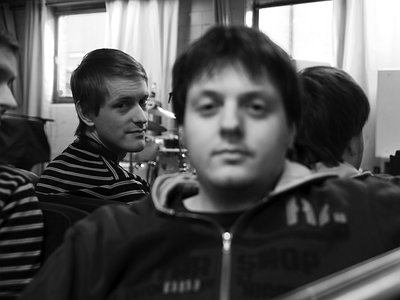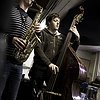Cinematic sounds
Some people see recording improvised music as a problem. Do you?
Not really. I think it depends. To me, some music definitively works better live than when recorded, and the other way around. So it’s not so much a problem recording improvised music, if the setting of the recording is right for the music and you have a good room and equipment and that your mind is in the right place etc.
In the 20th century, the relationship between music and other forms of art – painting, video art and cinema most importantly - has become increasingly important. How do you see this relationship yourself and in how far, do you feel, does music relate to other senses than hearing alone?
Often when we play with Ballrogg, people keep telling us we should work more with film and that the music sounds very cinematic. We even tried to connect with some Norwegian directors, but no luck so far. If there was an opportunity to work with film it would be really interesting to try it.
Ballrogg has done the music for a radio theatre piece of Per Petterson in Hessischer Rundfunk. It was nice to hear the music in such a different setting. We have also been talking about working with a videographer and surround sound on several occasions, so hopefully we'll have the opportunity to do it soon.
In how much, do you feel, are creative decisions shaped by cultural differences – and in how much, vice versa, is the perception of sound influenced by cultural differences?
I guess that you can say that some musical dialects are more accessible than others, and some appeals more to the brain than the soul and vice versa. We did a tour in China a few years ago with a Norwegian group called Muringa that plays free improvised music. We were a bit nervous about what to expect and how the audience would respond, since this kind of music is quite unusual there, and none of us had ever been to China before. But there were no problems what so ever. People were very positive and open minded. We ended the tour playing two nights in Kunming for about 300 people every night, which is a rather large crowd for this kind of music. So then it was really important how we presented the music and how we were able to communicate with the audience even though they didn’t have any previous experience with improvised music.
Do you feel it important that an audience is able to deduct the processes and ideas behind a work purely on the basis of the music? If so, how do you make them transparent?
No, I think that that’s not important. You should be able to appreciate the music without knowing the conditions and ideas behind it.
Usually, it is considered that it is the job of the artist to win over an audience. But listening is also an active, rather than just a passive process. How do you see the role of the listener in the musical communication process?
From time to time, it can be extremely frustrating being put in strange concert situations, due to misunderstandings or just being booked at the wrong venue. In these situations it can seem that it doesn’t matter what you do if the audience is talking and taking no notice. On the other hand it can be equally uplifting turning an audience that can go both ways, over to your side. When you are able to pull listeners that have no previous experience with this kind of music into the concert, that can be really satisfying.
Music-sharing sites and -blogs as well as a flood of releases in general are presenting both listeners and artists with challenging questions. What's your view on the value of music today? In what way does the abundance of music change our perception of it?
I think somebody said that music should be like water, it’s always there and you don’t have to think about it. Streaming services like Wimp and Spotify have contributed to this and in many ways devalued music in my opinion, especially in terms of improvised and experimental music, that sells in smaller volumes.
It’s very positive that so much music has become available through the internet. However there is still a long way to go before much of the music that’s not mainstream and available on physical format will be available for download. But it's difficult to say, since there is no end to how many copies you can sell of a digital download, the value gets inflated.
It's also hard to see how artists and bands can get the money to record and make new music, since the possibilities for covering expenses through selling music are on a steady decline. So overall it's getting more and more difficult staying afloat as a musician, and it's getting to a point where it's really difficult to find the means to produce and record new music.
In my opinion the more narrow music must take matters into their own hands and make their own solutions for digital distribution. Since the technology to do so is available at a very low cost, it's now possible to do things like this that weren’t possible 5 years ago. Hopefully new ideas on music distribution and new deals for streaming niche music will pull things in a more positive direction.
My response to this has been to open a website called subradar.no for high quality downloads of improvised and experimental music that also contains articles, news and video about related topics. It's important to have more than just a music store, you have to give people more reasons to visit a site, so subradar.no is made as a portal for this content.
So currently I'm spending my spare time contacting labels like Gaffer records, Clean Feed, Shhpuma, Hubro, Sofa and other labels like them to get all this related music in one place so people can discover new music without having go through the same agony that I did.
Please recommend two artists to our readers which you feel deserve their attention.
Well I'll have to say Kai Fagaschinski and Michael Thieke, two German clarinet and saxophone players that work in a number of different musical settings based around Berlin. They play together in The International Nothing which really inspired me when I first heard it some 7 years ago. They also play in a group called The Magic id. Really original and great music!
To read and hear more Ballrogg, visit www.ballrogg.no






